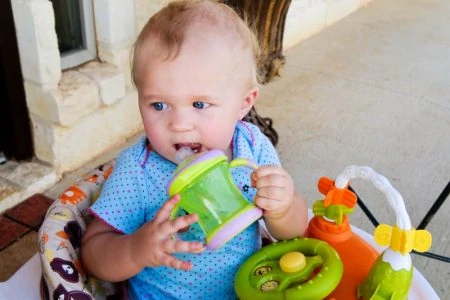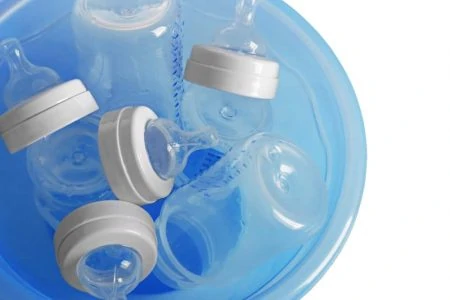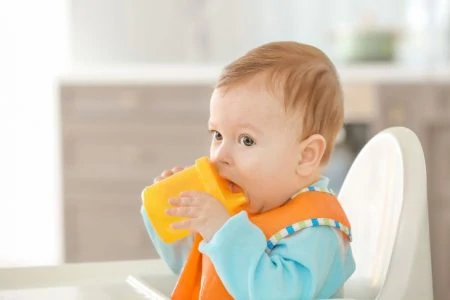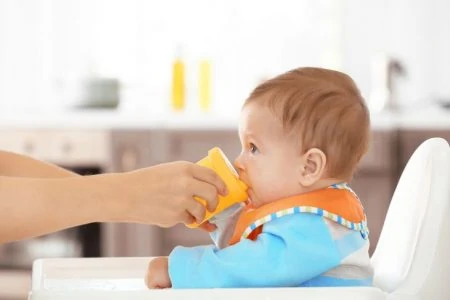Juice is a controversial topic in the parenting world. Years ago, giving a baby a bottle of apple juice was standard practice. Today, pediatric guidelines have shifted significantly, leaving many parents confused. Is juice safe? Does it offer any nutritional value? When is the right time to introduce it?
We consulted with pediatricians and dental experts to clear up the confusion.
In this article, we will break down the latest safety guidelines, the difference between whole fruit and fruit juice, and how to safely introduce juice once your child is old enough. We will also cover the specific exceptions for constipation and what to look for on the nutrition label.
Key Takeaways
- Wait until the first birthday: The AAP recommends avoiding juice completely for children under 12 months, unless a doctor advises it for constipation.
- Whole fruit is best: Babies get more fiber and nutrients from mashed or soft fruit than they do from extracted juice.
- Limit the quantity: Once introduced (after age 1), limit juice to 4 ounces per day to prevent obesity and tooth decay.
- Always dilute it: Mix juice with water (50/50 ratio) and serve it in an open cup or straw cup rather than a bottle to protect developing teeth.
The Official Rule: Wait Until 12 Months
Here is the short answer: you should generally wait until your baby is one year old before offering juice.
For a long time, parents were told 6 months was the magic number. However, the American Academy of Pediatrics (AAP) updated their guidelines to state that children under 12 months should avoid juice entirely (1).
There are several important reasons for this delay:
- Nutrition displacement: Breast milk or formula provides 100% of the nutrition a baby needs. Juice fills up their small stomach with sugary liquid, which might make them refuse the breast milk or formula they actually need to grow.
- Obesity risk: Introducing calorie-dense, sugary drinks too early is linked to a higher risk of childhood obesity (2).
- Developing digestion: A baby’s digestive system is sensitive. The high sugar content in juice, specifically sorbitol and fructose, can cause diarrhea and gas in infants.
The Exception: Constipation
There is one major exception to the “no juice under one” rule. If your infant is struggling with constipation, your pediatrician might recommend a small amount of pear, apple, or prune juice.
The sugars in these fruits draw fluid into the intestines, which helps soften stool. This should be treated as a medical remedy rather than a dietary staple. Always consult your doctor for the correct dosage before trying this (3).
7 Tips for Safely Introducing Juice
Once your child celebrates their first birthday, you can introduce juice as an occasional treat. However, it shouldn’t replace water or milk.
To keep your toddler healthy and their teeth safe, follow these guidelines:
1. Consult Your Pediatrician
Even though your child is one, it is smart to check in with your doctor. They know your child’s growth curve and medical history. If your child is gaining weight too fast or has a history of tummy troubles, your doctor might suggest skipping juice entirely in favor of whole fruit.
2. Treat It Like a Meal Component
Think of juice as part of a meal, not a thirst quencher. Offering juice alongside solids helps prevent blood sugar spikes.
When you first introduce it, treat it like any new food. While you don’t need to wait days between new foods anymore, keeping an eye out for rashes or digestive upset is still wise (4).
3. Distinguish Between Fruit and Juice
Nutritionally, a grape and grape juice are very different. The fruit contains fiber that helps digestion and makes your child feel full. The juice is mostly sugar and water.
Continue offering whole fruits (and vegetables) as the primary source of vitamins. Juice should be a “bonus,” not a daily requirement.
4. Serve Only With Meals
Grazing on juice throughout the day is a recipe for cavities. When a child sips juice for an hour, their teeth are under constant acid attack.
Serve juice only when they are sitting down to eat. This stimulates saliva flow, which helps wash away the sugars and acids protecting the tooth enamel.
5. Use a Cup, Not a Bottle
Never put juice in a baby bottle. Bottles allow liquid to pool around the teeth, leading to a condition formerly known as “baby bottle tooth decay” (5).
Instead, serve juice in an open cup or a straw sippy cup. This encourages better swallowing mechanics and minimizes the time the liquid touches the teeth.
6. Stick to the Limits
Portion control is key. According to the AAP, toddlers aged 1 to 3 years should have no more than 4 ounces of juice per day (6).
Exceeding this amount can lead to “failure to thrive” because the child fills up on empty calories and refuses healthy fats and proteins (7).
7. The 50/50 Dilution Rule
To reduce the sugar load and acidity, always dilute juice with water. A 50/50 mix (half water, half juice) is perfect. It gives them the flavor they want without the intense sugar rush, and it helps keep them hydrated.
Pasteurized vs. Fresh Squeezed
You might assume that fresh-squeezed juice or “raw” juice from a health food store is the healthiest option. While it sounds natural, raw juice can pose risks for young children.
Freshly squeezed, unpasteurized juices can contain harmful bacteria like Salmonella, E. coli, and Cryptosporidium (8). Adults might handle these bacteria fine, but young immune systems are more vulnerable.
Foodborne illness in young children can cause:
- Severe diarrhea and vomiting.
- Dehydration.
- Fever and chills.
- Bloody stools.
To be safe, always buy pasteurized juice from the grocery store. Pasteurization involves heating the liquid to kill bacteria. If you do make juice at home, experts recommend boiling the fruit first to eliminate potential contaminants, though this does reduce nutritional value.
Side Effects to Watch For
Even if you follow all the rules, some children simply don’t tolerate juice well.
Keep an eye out for these common reactions:
1. Toddler’s Diarrhea
This is a classic condition often caused by drinking too much fruit juice. The excess fructose and sorbitol draw water into the gut, leading to loose, watery stools. If your child has chronic loose stools, cutting out juice is usually the first step doctors recommend.
2. Loss of Appetite
If your child is picking at their dinner or refusing milk, think about how much juice they had earlier. Those calories add up quickly and can suppress the appetite for nutrient-dense foods needed for brain development.
3. Dental Issues
Juice is acidic and sugary. If you notice white spots on your child’s teeth or sensitivity, it could be the start of enamel erosion. Brush their teeth after juice, or have them rinse with plain water.
Watch Out For Imposters
4. Gas and Bloating
Babies and toddlers often have a hard time digesting certain sugars. Apple and pear juice are high in sorbitol, which can ferment in the gut and cause painful gas and bloating. If your child seems fussy after drinking juice, try switching to water or diluting the juice further.










